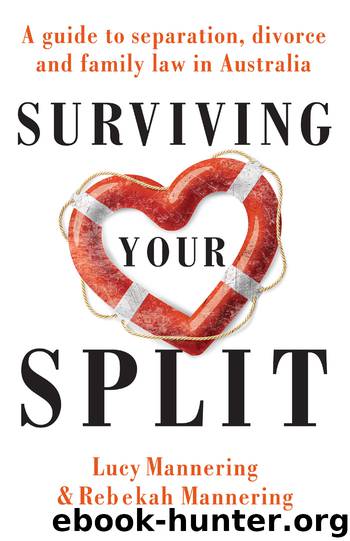Surviving Your Split: A Guide to Separation, Divorce and Family Law in Australia by Lucy Mannering & Rebekah Mannering

Author:Lucy Mannering & Rebekah Mannering [Mannering, Lucy & Mannering, Rebekah]
Language: eng
Format: epub
Tags: Law, Family Law, Divorce & Separation, Family & Relationships, General, Self-Help
ISBN: 9780522872798
Google: BwtNDwAAQBAJ
Publisher: Melbourne University Publishing
Published: 2018-02-27T01:05:36.959000+00:00
You cannot be merely passive but must take positive action and this positive obligation includes taking all reasonable steps to ensure that the order is put into effect. You must also positively encourage your children to comply with the orders. For example where the order states your children are to spend time with another party, you must not only ensure that the children are available but must also positively encourage them to go and do so.
The brochure (which you can also find online54) details places where you can get help if there are difficulties in getting the kids to go to see their other parent, such as Family Relationships Online (www.familyrelationships.gov.au) or a Family Relationship Centre. Other help is available, such as from a child psychologist or a school counsellor, who can help parents get to the bottom of the problem together.
You must also be aware that if you do not actively support your children’s right to know and be cared for by their other parent, then the courts can and do make orders that the children live with their other parent.
Case study—Martina and Jonah
Martina and Jonah separated after a brief, three-year marriage. They had two children, James and Lily, who were aged two and four at the time of the separation and were now aged eight and ten. Martina was not a fan of Jonah, who had remarried and had two more children.
Since the separation, James and Lily had lived with Martina, who was an attentive and involved mother. She organised many after-school activities for the children, who went to excellent schools, were always on time to class, and had close, attached relationships with their mother.
The children were supposed to spend time with their father every second weekend and for half of the school holidays. He was considered by the court to be a ‘good enough parent’ who didn’t particularly want the children to live with him, but did want to spend time with them.
However, Martina did not take active steps to foster a positive relationship between the children and their father. In fact, Martina made it clear that she would prefer the children did not have a relationship with Jonah at all. She often organised activities, such as family camping trips, on the weekends the children were supposed to be with their father, and put the children in the position where they had to choose where they would go for the weekend. She also made it clear to the children that she did not like their father ringing the house to talk to them. James, in particular, had a very difficult relationship with his father and had made allegations of abuse against him, which were not substantiated.
The matter went to a full hearing of the Family Court. After a five-day hearing, the court ordered that James and Lily live with their father full time, and further ordered that the children only have supervised contact with their mother for two hours a fortnight for a period of no less than six months.
Download
This site does not store any files on its server. We only index and link to content provided by other sites. Please contact the content providers to delete copyright contents if any and email us, we'll remove relevant links or contents immediately.
Hit Him Where It Hurts by Sherri Donovan(494)
Surviving Separation And Divorce by Loriann Hoff Oberlin(486)
Divorce with Decency by Bradley A. Coates(410)
Breaking Bonds by Rosemary Lombardy(342)
Fair Share Divorce for Women, Second Edition by kathleen a. miller(328)
Surviving Your Split: A Guide to Separation, Divorce and Family Law in Australia by Lucy Mannering & Rebekah Mannering(220)
